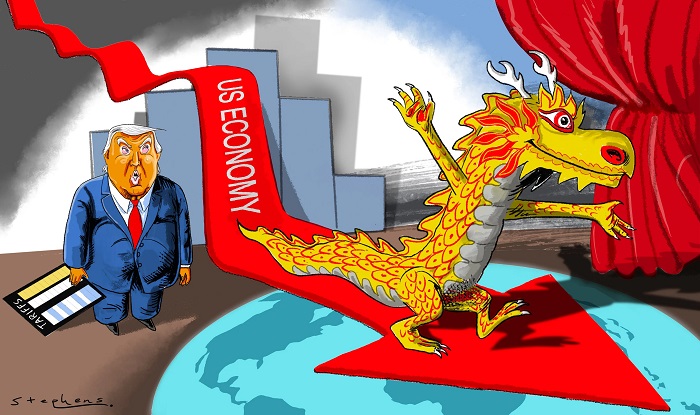-By External Affairs Correspondent

(Lanka-e-News -10.April.2025, 11.10 PM) Tariffs will end up hitting the US 'have-nots' hardest while failing to dethrone China as top producer of everyday goods
When US President Donald Trump signed the historic tariff orders that launched the global tariff war on April 2, the pen he used could well have been made in China.
Even if we leave aside that particular pen, the paperwork that follows will mainly be processed with tools sourced from Chinese factories, which now face an accumulated American tariff of around 125 per cent.
The irony underscores a deeper truth about the US-China trade relationship: tariffs meant to punish Beijing often end up hitting American consumers hardest while failing to dislodge China's dominance in everyday goods. The most affected American people are those who can least afford a more expensive alternative because many of these Chinese goods are small daily necessities.
Do you have questions about the biggest topics and trends from around the world? Get the answers with SCMP Knowledge, our new platform of curated content with explainers, FAQs, analyses and infographics brought to you by our award-winning team.
US trade data reveals a startling reality: about 85 per cent of the pens and pencils in the United States are made in China. In 2022 alone, Americans bought US$430 million worth of pens from Chinese suppliers. Even leading brands such as Bic and Paper Mate rely on Chinese components.
The mountains of paperwork unleashed by the president's wild economic gamble will become much more expensive after this week, and there is no real alternative in sight. China claims 80 per cent of the global market share of stationery.
It is not just the writing instruments. When Trump's deeply religious faithful go to church to pray for a trade war victory, the Bibles in their hands are most likely to have been printed... again in China!
Amity Printing Company in Nanjing, China is the world's largest Bible producer. Since 1987, it has printed over 200 million copies of "the good book", all for export. About half of these are estimated to be sold to the American market. According to US International Trade Commission data, atheist China accounts for 70 to 80 per cent of America's religious book imports.
Despite years of diversification efforts, one-third of the garlic cloves Americans consume, half of the cheap furniture in their homes, and nearly 80 per cent of their Christmas toys are still made in China. Even the wooden frames holding up Trump's august image decorating every government office are probably Chinese, as China supplies 70 per cent of photo frames in the US.
The list can go on and on. The fact is that China's dominance in these easily overlooked, small, but essential daily items is built on economies of scale and production efficiency that American factories - or those of any other country - struggle to match.
Trump's tariffs were designed to revive American manufacturing and reduce dependence on China. But in many areas, domestic manufacturers are simply non-existent. It will take years for them to set up production, rebuild the supply and distribution networks, and match China's scale and effectiveness.
No matter how many more times Trump signs off on a new round of duties on Chinese goods, the first result will be pricier pens and paper.
US Treasury Secretary Scott Bessent tried to shrug off the carnage in the financial markets after the tariffs announcement by implying that most affected people were wealthy, and that American workers - the president's key supporters - would only benefit.
"The top 10 per cent of Americans own 88 per cent of equities, the next 40 per cent own 12 per cent. The bottom 50 per cent have debts. They rent their homes. They have auto loans," he said in an interview with Tucker Carlson.
The reality is that while some rich folks may indeed have been burned in the recent market bloodbaths, most of them will survive and might even be able to recoup their losses later. The tariffs, particularly on China and other Asian countries, are going to affect the 50 per cent of American "have-nots" the most.
This is because China's dominance is particularly pronounced in small but indispensable daily necessities. The "have-yachts" could source their luxury products elsewhere, but the "have-nots" often have no choice but to suck up the tariff costs.
There's poetic justice in the fact that the tools Trump used to wage his trade war - pens, podiums, and promotional materials - were probably made by the very economy he sought to undermine. It's a reminder that in a globalised world, economic isolationism is easier said than done.
Tariffs may sound tough on paper, but in practice, they often amount to a tax on ordinary Americans. Until the US can either rebuild its manufacturing base or convince consumers to pay premium prices for domestically made staples, China's grip on everyday goods will remain unshaken, no matter how many tariffs are signed into law.
-By External Affairs Correspondent
---------------------------
by (2025-04-10 18:07:34)
Leave a Reply